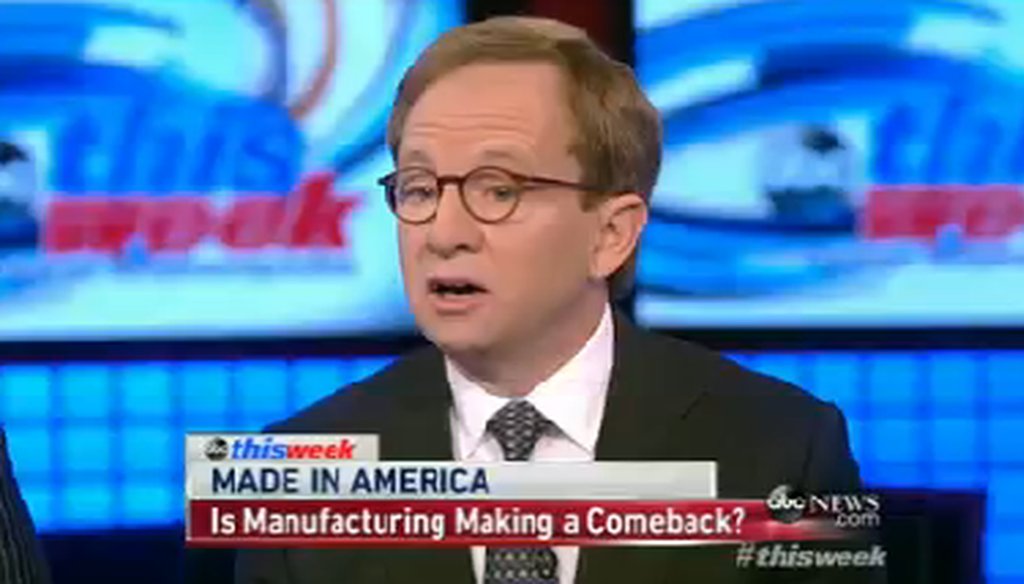Stand up for the facts!
Our only agenda is to publish the truth so you can be an informed participant in democracy.
We need your help.
I would like to contribute

Steven Rattner appeared on ABC's "This Week."
An internal report clearing New Jersey Gov. Chris Christie of wrongdoing in the "Bridgegate" scandal has breathed new life into the months-old controversy.
On Sunday, politicians and pundits debated the findings of the report -- which was ordered by Christie -- and how much stock to put into the investigation in the first place.
Former New York City mayor and Christie ally Rudy Giuliani said the report isn’t a complete investigation, but it is a good first step. "I think this is a pretty strong report. It is not conclusive. No one claims it is, but it's a good step in the right direction," Giuliani said on Meet the Press.
The line caught us, and New Jersey state Sen. Loretta Weinberg, a Democrat, a bit off guard. Speaking later, Weinberg said: "It’s the governor who’s saying it’s conclusive."
We wanted to see just what the report says and how some are interpreting it.
According to the report, investigators had access to personal and private email accounts and phone records of Christie and his current and former staff members. They reviewed more than 250,000 documents and conducted 70 interviews.
The findings were detailed in a 360-page document looking at both the bridge scandal and allegations Christie withheld Hurricane Sandy aid from a New Jersey town for political reasons.
The authors are upfront that there is one big hole in their investigation: They were not able to interview Christie aide Bridget Kelly or Port Authority official David Wildstein. But that didn’t keep them from strong conclusions.
"Based on our investigation, we are now in a position to address most but not all of these allegations, as several key witnesses have refused to cooperate with our investigation or asserted their Fifth Amendment rights," the report said.
The report concluded that those two individuals were at the center of the controversy, and the only major missing piece is understanding why they took such actions.
"We are therefore confident that, based on our thorough review, we have a clear understanding of what happened here, even if the participants’ precise motives remain to be determined," the report said.
Later, in the conclusion, the report stated rather definitively: "In sum, we have not found any evidence of anyone in the governor’s office knowing about the lane realignment beforehand or otherwise being involved, besides Bridget Kelly. Whatever motivated Wildstein and Kelly to act as they did, it was not at the behest of Gov. Christie, who knew nothing about it."
Christie took questions from reporters for more than an hour last week after the report was released, his first since the early days of the controversy.
In his remarks, Christie called the report "exhaustive" in its breadth and the access investigators were allowed. He noted he even turned over his personal cell phone.
"It’s an exhaustive report that follows the mandate that I set out when I commissioned the review," Christie said. "I told (Mastro) to go find the truth no matter where it led and to turn over every rock to get to the bottom of what happened and to let me know what the truth was."
For his part, Mastro had strong language in backing up the report’s findings and on ABC's This Week,Mastro didn’t hold back.
"I have to say this, for the skeptics out there, there are some who have a visceral reaction to this bridge controversy," he said. "Reminds me of the (A Few Good Men) movie line, ‘They can't handle the truth.’ We believe we got to the truth."
The broader point here, of course, is that critics of the report say the investigation is anything but conclusive, as it was ordered by Christie. In that regard, Giuliani was no doubt trying to tamp down any fires.
But in doing so he ignored the claims of both Christie and Mastro. We rate Giuliani’s statement Mostly False.
On ABC’s This Week, meanwhile, economist Steven Rattner talked about the failings of the manufacturing industry in the United States.
A big takeaway: People tend to think manufacturing jobs pay well, but that isn’t necessarily the case. To illustrate his point, Rattner said, "Manufacturing wages today in America on a per-hour basis are actually a bit lower than average wages in the economy as a whole."
This claim rates Mostly True.
Rattner pointed to U.S. Bureau of Labor Statistics data for average hourly earnings of production and nonsupervisory employees in the private sector, which make up about four-fifths of total private-sector employment.
The most recent data for February 2014 shows the average hourly private-sector wage was $20.50.
The manufacturing industry average was, as Rattner said, a bit lower at $19.43. Hourly wages are almost $3 higher for employees who produce durable goods, such as cars, phones and computers, than those who make nondurable goods, or things like food, gas and clothes.
Weekly wages tell a different story, with manufacturers earning almost $122 more a week than the total worker average in February. The reason for the discrepancy between hourly and weekly wages is simple: Manufacturers work more hours. "Anyone can work more hours and make more money," Rattner said.
But manufacturers also earn more money an hour when you factor in supervisors. BLS data for February show average hourly earnings are $24.31 for all private-sector employees and $24.72 for manufacturing employees -- the opposite of what Rattner said.
Which dataset is better? The question can incite an economists’ quarrel, experts told us.
"But my point remains the same: The perception that manufacturing jobs are ‘better’ jobs is out of date," Rattner said.
Staff writers Steve Contorno and Katie Sanders contributed to this report. Aaron Sharockman is the editor of PunditFact.com.
Our Sources
See individual fact-checks.




























